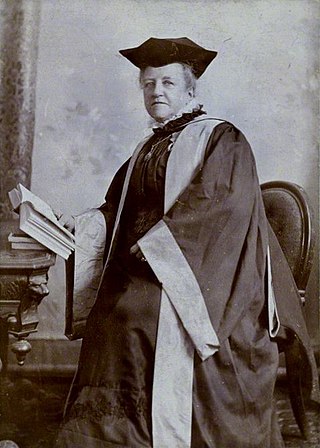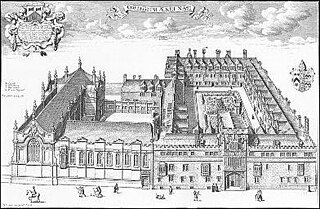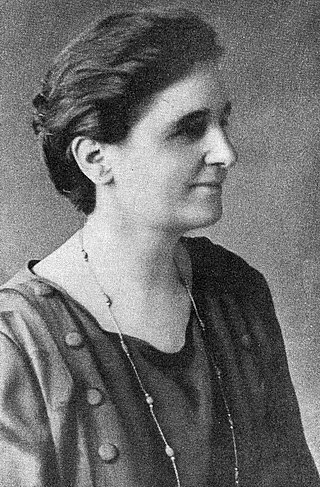Related Research Articles

St Hilda's College is one of the constituent colleges of the University of Oxford in England. The college is named after the Anglo-Saxon saint Hilda of Whitby and was founded in 1893 as a hall for women; it remained a women's college until 2008. St Hilda's was the last single-sex college in the university as Somerville College had admitted men in 1994. The college now has almost equal numbers of men and women at both undergraduate and postgraduate level.

St Hugh's College is one of the constituent colleges of the University of Oxford. It is located on a 14.5-acre (5.9-hectare) site on St Margaret's Road, to the north of the city centre. It was founded in 1886 by Elizabeth Wordsworth as a women's college, and accepted its first male students in its centenary year in 1986. It enjoys a reputation as one of the most attractive colleges because of its extensive gardens.

Dorothea Beale LL.D. was a suffragist, educational reformer and author. As Principal of Cheltenham Ladies' College, she became the founder of St Hilda's College, Oxford.

The University of Oxford has thirty-nine colleges, and four permanent private halls (PPHs) of religious foundation. Colleges and PPHs are autonomous self-governing corporations within the university. These colleges are not only houses of residence, but have substantial responsibility for teaching undergraduate students. Generally tutorials and classes are the responsibility of colleges, while lectures, examinations, laboratories, and the central library are run by the university. Students normally have most of their tutorials in their own college, but often have a couple of modules taught at other colleges or even at faculties and departments. Most colleges take both graduates and undergraduates, but several are for graduates only.

Bedford College was founded in London in 1849 as the first higher education college for women in the United Kingdom. In 1900, it became a constituent of the University of London. Having played a leading role in the advancement of women in higher education and public life in general, it became fully coeducational in the 1960s. In 1985, Bedford College merged with Royal Holloway College, another constituent of the University of London, to form Royal Holloway and Bedford New College. This remains the official name, but it is commonly called Royal Holloway, University of London (RHUL).
Hilda Frances Margaret Prescott, more usually known as H. F. M. Prescott, was an English writer, academic and historian. She was made a Fellow of the Royal Society of Literature. Her best-known work is a novel, The Man on a Donkey, set in the 16th century.
Dame Joan Evans was a British historian of French and English medieval art, especially Early Modern and medieval jewellery. Her notable collection was bequeathed to the Victoria and Albert Museum in London.

Dame Elizabeth Wordsworth (1840–1932) was founding Principal of Lady Margaret Hall, Oxford and she funded and founded St Hugh's College. She was also an author, sometimes writing under the name Grant Lloyd.
Dame Margaret Janson Tuke was a British academic and educator. She was the youngest child of the philanthropist James Hack Tuke. She was created a Dame Commander of the Order of the British Empire in 1932.

Dame Emily Penrose, was an ancient historian and principal of three early women's university colleges in the United Kingdom: Bedford College from 1893 until 1898, Royal Holloway College from 1898 until 1907, and Somerville College, Oxford University from 1907 until 1926. She was the first woman to achieve First Class honours in Classics at Oxford University, and was instrumental in securing the admission of women as full members of the university in 1920. She became Oxford's first Dame in 1927.

Milham Ford School was a girls' secondary school in Oxford, England, located in the suburb of New Marston on Marston Road. It was founded in East Oxford in the 1880s and closed in 2003.
The principal is the chief executive and the chief academic officer of a university or college in certain parts of the Commonwealth.

Lilian Mary Faithfull CBE was an English teacher, headmistress, women's rights advocate, magistrate, social worker, and humanitarian. She was one of the "Steamboat ladies" who were part of the struggle for women to gain university education.
Evelyn Emma Stefanos Procter, FRHistS was a British historian and academic. She served as principal of St Hugh's College, Oxford, from 1946 to 1962.
Ida Winifred Busbridge (1908–1988) was a British mathematician who taught at the University of Oxford from 1935 until 1970. She was the first woman to be appointed to an Oxford fellowship in mathematics.

Christine Mary Elizabeth Burrows was a British academic administrator who the second Principal of St Hilda's College, Oxford, from 1910 to 1919 and the second Principal of St Anne's College, Oxford, from 1921 to 1929.

Hilda Margaret Lyon, MA, MSc, AFRAeS was a British engineer who invented the "Lyon Shape", a streamlined design used for airships and submarines.
Betty Kemp was an English historian specialising in the British constitution. She lectured at the University of Manchester, before moving to the St Hugh's College, Oxford where she was a Tutor, and later a Fellow in Modern History, and Fellow Emerita.

Margaret Hilda Harper was an Australian pediatrician, medical writer, and radio commentator. Harper was one of the two physicians who described that coeliac disease in the pancreas and cystic fibrosis were "distinct entities" in the 1930s.
References
- ↑ "Keith Thomas – Heritage or History? Conflicting Views of the Past". Backdoor Broadcasting Company. Retrieved 10 June 2021.
- ↑ "University Research". History. 4 (15): 176–180. 1919. doi:10.1111/j.1468-229X.1919.tb00347.x. ISSN 1468-229X.
- ↑ Archive and Special Collections, Series: Hayes Robinson, Margaret. Royal Holloway, University of London. RHC AR/123.
- ↑ "St Hugh's College, Oxford - Club Paper, Jun 1899". Issuu. Retrieved 10 June 2021.
- ↑ "Home | Education and Activism: Women at Oxford: 1878-1920". www.firstwomenatoxford.ox.ac.uk. Retrieved 10 June 2021.
- 1 2 "St Hugh's College, Oxford - Chronicle 1929-1930". Issuu. Retrieved 10 June 2021.
- ↑ Batson, Judy G. (2008). Her Oxford. Nashville, Tenn.: Vanderbilt University Press. ISBN 978-0-8265-9250-7. OCLC 435528503.
- ↑ Baston, Judy (2008). Her Oxford. Vanderbilt University Press. p. 136.